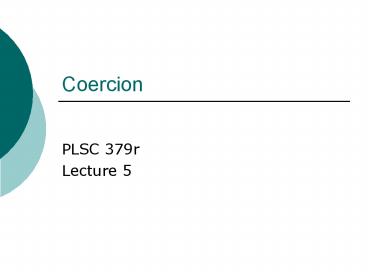Coercion - PowerPoint PPT Presentation
1 / 21
Title:
Coercion
Description:
Puzzle: What types of strategies do states use to coerce? ... Is coercion (especially punishment) more likely to coerce democracies than autocracies? ... – PowerPoint PPT presentation
Number of Views:1535
Avg rating:3.0/5.0
Title: Coercion
1
Coercion
- PLSC 379r
- Lecture 5
2
The Game
- Anarchy leads to mistrust which makes cooperation
difficult - Very hard to issue a deterrent threat that hurts
you as well as your adversary - Coercion even more difficult than deterrence
3
Coercer makes threat
Target concedes
Target resists
Coercion succeeds
Coercer attacks
Coercer backs down
Coercion fails
Complete military victory Coercion fails
Target gives in Coercion succeeds
Coercer gives up Coercion fails
4
Pape
- Puzzle What types of strategies do states use to
coerce? What explains why coercion works or
fails? - The conventional wisdom is that the best way to
coerce is to induce suffering on civilian
population. Is this correct?
5
Theories of Resolve
- Balance of resolve
- Balance of interests
- Vulnerability of targets civilian population
- Balance of forces
- Cant explain variation with a constant!
- Vietnam War Johnsons 1965 bombing campaign
failed to coerce the North Vietnamese, but
Nixons 1972 campaign succeeded.
6
Three Strategies
- Punishment
- Risk
- Denial
7
The Logic of Coercion (Pape 16)
- R B p(B) C p(C)
- R value of resistance
- B potential benefits of resistance
- P(B) probability of attaining benefits by
continued resistance - C potential costs of resistance
- P(C) probability of suffering costs
- Usually nothing a coercer can do to manipulate
benefits - Coercers focus on raising costs
8
Punishment
- Punishment inflicting damage on civilian
population - Sparta forced Athens to surrender by cutting off
food - Bombing on London in WWI caused riots and people
even attacked members of the Royal Flying Corps.
Attacks in WWII far more severe but did not cause
such tumult. - No gas used (tit for tat?)
- USAF fire bombings did more damage than the two
atomic weapons that were dropped on Japan - EXPECTATIONS
- During WWII, Germany first reported overestimated
reports of damage done by allied bombing, so that
later they reported a corrected report and it
didnt seem so bad
9
Punishment
- Why it fails
- Issue importance is such that populations are
willing to accept high costs - It is difficult to inflict a significant amount
of damage on populations - Relatively easy to defend against (evacuation,
economic adjustments) - Rally around the flag
10
Risk
- Risk incrementally increasing the amount of
civilian damage inflicted - Why it fails
- Based on fear of damage rather than real damage
- Produces less damage than punishment (and
remember that it was hard to produce enough
damage via punishment) - Limited nature of attacks can be interpreted as
political weakness or lack of resolve
11
Decapitation
- Decapitation strategies attempt to remove or
isolate the targets leadership. - US strategy in Iraq and Somalia
- Why it fails
- Very hard to find and kill individuals
- Leaders preferences are often a reflection of
societys preferences - Succession is unpredictable
12
Denial
- Denial Take away the enemys physical ability to
control territory - Direct support of ground forces
- Effective when fronts are static
- Strategic interdiction destroy source of
targets military production or isolate it from
combat theaters - Only effective in protracted wars
- Operational interdiction attacks rear area
support or maneuvering forces - Most effective when front lines are fluid
(breakouts, maneuvers)
13
Denial
- When it works
- Rarely
- When it takes opponents strategy into account
- Limitations
- Only works over specific territory
- Military pressure must be constant
- Expensive
14
Regime Type
- Is coercion (especially punishment) more likely
to coerce democracies than autocracies? - Since democratic leaders know they can be
removed, will they give into demands to avoid
suffering even small costs? - Since democratic populations can more easily
remove governments, the logic of punishment might
work better - On the other hand, because democratic populations
have a greater connection to the government, the
rally might be stronger
15
Horowitz and Stam
- HS found that the regime type of the target has
no effect on whether a state can be coerced (so a
democratic country no more or less likely to be
coerced)
16
Economic Coercion Pape (again!!!)
- Puzzle are economic sanctions an effective
coercion tool? If so, under what conditions are
they likely to succeed - Look only at political coercion
- Do not count minimal concessions
- Do not count if it was really military force that
brought concessions - Only 5 of 115 cases indicated successful economic
coercion
17
Explaining Failure
- Modern nation states are simply not very frail
- Iraq lost 48 of its GNP over 5 years and still
held out - Cuba
- Nationalism makes states and societies willing to
endure considerable punishment rather than have
policy dictated by a foreign power
18
Duh!(?)
- If sanctions so rarely work, why do states use
them? - Strategic interaction
- Selection
19
Coercer
threat
threat
No coercion
Target
Back down
Resist
Coercers can be resolute or irresolute. Targets
can be compliant or resilient
Coercer
Coercion succeeds
Sanctions
Back down
Coercion fails
Target
Give in
resist
Coercion succeeds
Coercion fails
20
Coercer
Resolute
Irresolute
Coercer makes threat, target backs down No threat, SQ (Coercer bluffs, target backs down)
Coercer makes threat, targets resists, threat carried out No threat, SQ (Coercer bluffs but has to back down)
Compliant
Target
Resilient
21
Threats
- When sanctions are likely to be successful, the
threat will be sufficient - States that ignore the threat of sanctions, are
not likely to give in when facing sanctions - Even failed sanctions may have a positive effect
on the coercers reputation, making future
opponents more likely to believe threats
(commitment problem)































